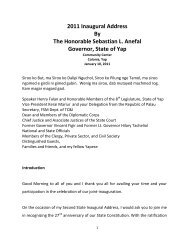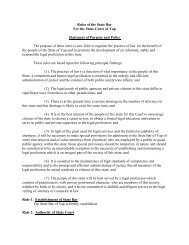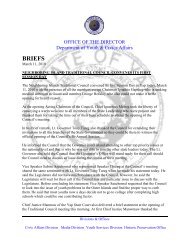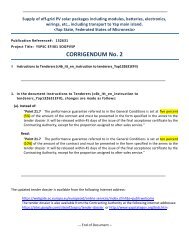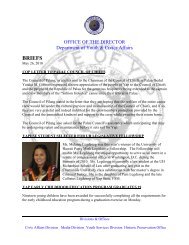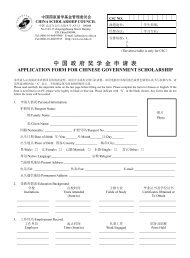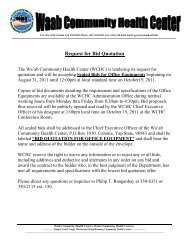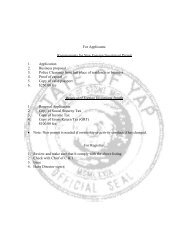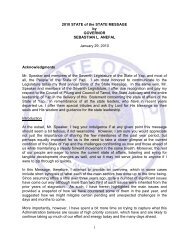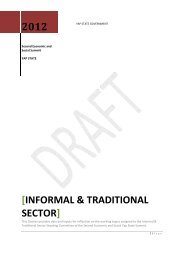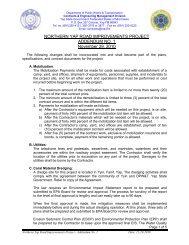RULES OF CIVIL PROCEDURE For the Trial Division of the Yap ...
RULES OF CIVIL PROCEDURE For the Trial Division of the Yap ...
RULES OF CIVIL PROCEDURE For the Trial Division of the Yap ...
You also want an ePaper? Increase the reach of your titles
YUMPU automatically turns print PDFs into web optimized ePapers that Google loves.
court at any time <strong>of</strong> its own initiative or on <strong>the</strong> motion <strong>of</strong> any party and after such notice,<br />
if any, as <strong>the</strong> court orders. During <strong>the</strong> pendency <strong>of</strong> an appeal, such mistakes may be so<br />
corrected before <strong>the</strong> appeal is docketed in <strong>the</strong> Appellate <strong>Division</strong>, and <strong>the</strong>reafter while <strong>the</strong><br />
appeal is pending may be so corrected with <strong>the</strong> permission <strong>of</strong> <strong>the</strong> Appellate <strong>Division</strong>.<br />
(b) Mistakes; Inadvertence; Excusable Neglect; Newly Discovered Evidence; Fraud,<br />
Etc. On motion and upon such terms as are just, <strong>the</strong> court may relieve a party or his legal<br />
representative from a final judgment, order or proceeding for <strong>the</strong> following reasons: (1)<br />
mistake, inadvertence, surprise, or excusable neglect; (2) newly discovered evidence<br />
which by due diligence could not have been discovered in time to move for a new trial<br />
under Rule 59(b); (3) fraud (whe<strong>the</strong>r heret<strong>of</strong>ore denominated intrinsic or extrinsic),<br />
misrepresentation, or o<strong>the</strong>r misconduct <strong>of</strong> an adverse party; (4) <strong>the</strong> judgment is void; (5)<br />
<strong>the</strong> judgment has been satisfied, released, or discharged, or a prior judgment upon which<br />
it is based has been reversed or o<strong>the</strong>rwise vacated, or it is no longer equitable that <strong>the</strong><br />
judgment should have prospective application; or (6) any o<strong>the</strong>r reason justifying relief<br />
from <strong>the</strong> operation <strong>of</strong> <strong>the</strong> judgment. The motion shall be made within a reasonable time,<br />
and for reasons (1), (2), and (3) not more than one year after <strong>the</strong> judgment, order or<br />
proceeding was entered or taken. A motion under this subdivision (b) does not affect <strong>the</strong><br />
finality <strong>of</strong> a judgment or suspend its operation. This rule does not limit <strong>the</strong> power <strong>of</strong> a<br />
court to entertain an independent action to relieve a party from a judgment, order, or<br />
proceeding, or to set aside.a judgment for fraud upon <strong>the</strong> court. The procedure for<br />
obtaining any relief from a judgment shall be by motion as prescribed in <strong>the</strong>se rules or by<br />
an independent action.<br />
Rule 61. Harmless Error. No error in ei<strong>the</strong>r <strong>the</strong> admission or <strong>the</strong> exclusion <strong>of</strong> evidence<br />
and no error or defect in any ruling or order or in anything done or omitted by <strong>the</strong> court<br />
or by any <strong>of</strong> <strong>the</strong> parties is ground for granting a new trial or for, vacating, modifying, or<br />
o<strong>the</strong>rwise disturbing a judgment or order, unless refusal to take such action appears to <strong>the</strong><br />
court inconsistent with substantial justice. The court at every stage <strong>of</strong> <strong>the</strong> proceeding<br />
must disregard any error or defect in <strong>the</strong> proceeding which does not affect <strong>the</strong> substantial<br />
rights <strong>of</strong> <strong>the</strong> parties.<br />
Rule 62. Stay <strong>of</strong> Proceedings to Enforce a Judgment.<br />
(a) Automatic Stay; Exception - Injunctions and Receiverships.<br />
Except as stated in this rule, no execution shall issue upon a judgment nor shall<br />
proceedings be taken for its enforcement until <strong>the</strong> expiration <strong>of</strong> 10 days after its entry.<br />
Unless o<strong>the</strong>rwise ordered by <strong>the</strong> court, an interlocutory or final judgment in an action for<br />
an injunction or in a receivership action, shall not be stayed during <strong>the</strong> period after its<br />
entry and until an appeal is taken or during <strong>the</strong> pendency <strong>of</strong> an appeal. The provisions <strong>of</strong><br />
subdivision (c) <strong>of</strong> this rule govern <strong>the</strong> suspending, modifying, restoring, or granting <strong>of</strong> an<br />
injunction during <strong>the</strong> pendency <strong>of</strong> an appeal.<br />
(b) Stay on Motion for New <strong>Trial</strong> or <strong>For</strong> Judgment. In its discretion.and on such<br />
conditions for <strong>the</strong> security <strong>of</strong> <strong>the</strong> adverse party as are proper, <strong>the</strong> court may stay <strong>the</strong><br />
execution <strong>of</strong> or any proceedings, to enforce a judgment pending <strong>the</strong> disposition <strong>of</strong> a<br />
motion for a new trial or to alter or amend a judgment made pursuant to Rule 59, or <strong>of</strong> a



